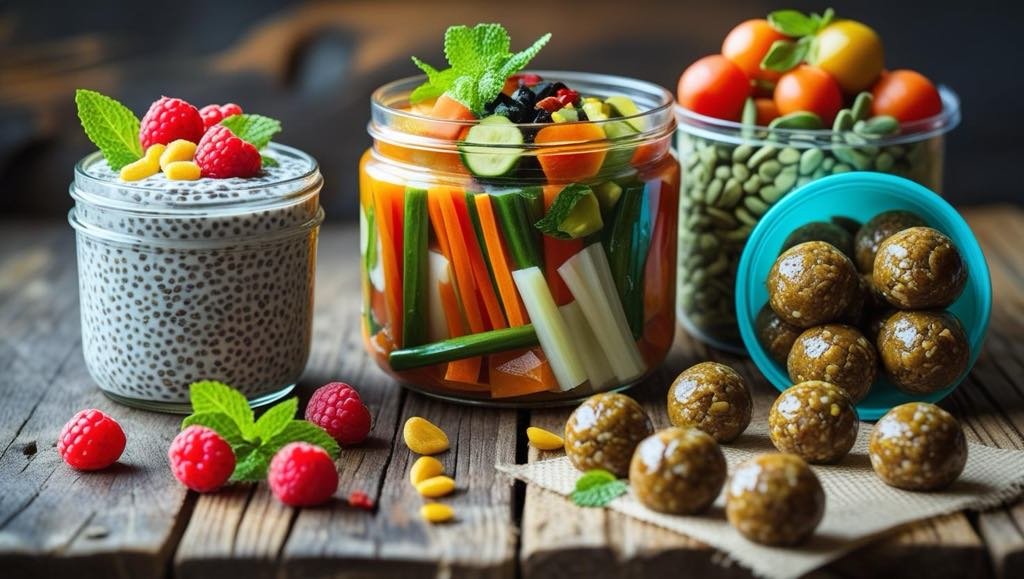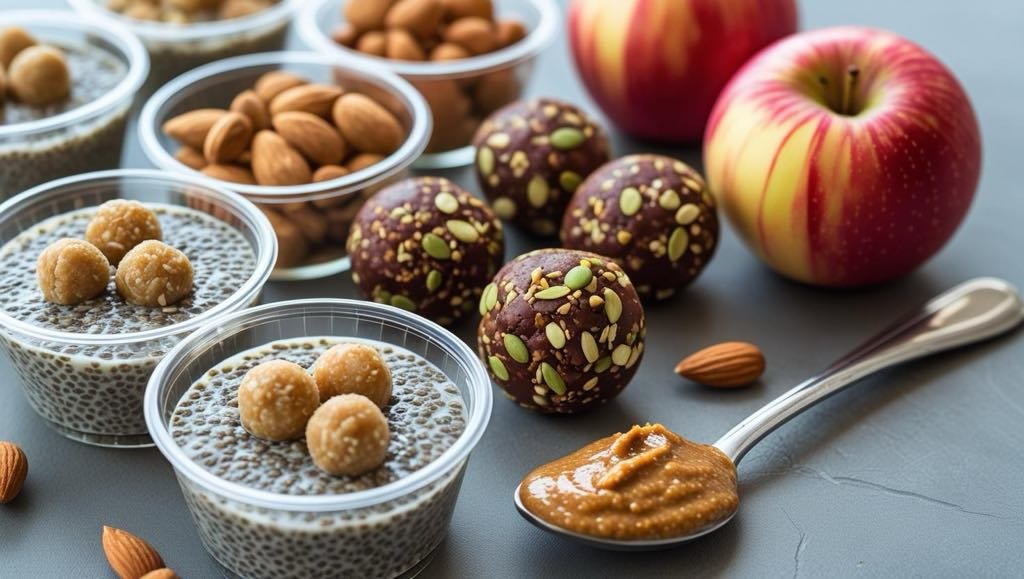Picture this: You’re three hours into your dream summer road trip, the windows are down, your favorite playlist is humming through the speakers, and then it hits—that uncomfortable bloated feeling from the gas station snacks you grabbed an hour ago. Your energy crashes, your stomach feels off, and suddenly that beautiful scenic route doesn’t seem quite as enjoyable.
Sound familiar? You’re not alone. Long car rides and convenient processed snacks are notorious for wreaking havoc on our digestive systems, leaving us feeling sluggish, uncomfortable, and far from our best travel selves.
But here’s the thing—your summer adventure doesn’t have to come with a side of digestive distress. With a little planning and the right gut-healthy snacks, you can fuel your body, maintain steady energy, and actually feel amazing throughout your entire journey.
Your gut does so much more than just process food. It influences your mood, supports your immune system, affects your energy levels, and even impacts how clearly you think. When you’re traveling, changes in routine, sleep patterns, hydration, and food choices can throw your gut microbiome completely out of balance.
In this guide, you’ll discover seven scientifically-backed, delicious gut-healthy road trip snacks that are easy to prepare, travel-friendly, and designed to keep your digestion smooth and your energy stable. From creamy chia puddings to crunchy fermented veggies, these recipes will transform your road trip snacking game while supporting your commitment to clean, healthy living.
Table of Contents
- Why Your Gut Health Matters on Road Trips
- The Science Behind Gut-Friendly Travel Snacking
- 7 Best Gut-Healthy Road Trip Snacks
- Pro Tips for Gut-Friendly Road Trip Snacking
- Meal Prep and Packing Strategies
- Frequently Asked Questions
Why Your Gut Health Matters on Road Trips
When you’re sitting in a car for hours, eating irregularly, and reaching for whatever’s convenient, your digestive system faces unique challenges that can quickly derail your travel experience.
The Travel Gut Challenge
Your gut microbiome houses trillions of bacteria that are crucial for digestion, nutrient absorption, immune health, and even mood regulation. During travel, several factors conspire to disrupt this delicate ecosystem:
Routine Disruption: Your gut thrives on consistency. Irregular meal times, different sleep schedules, and altered hydration patterns can throw your digestive rhythm off balance.
Stress Response: Long drives and changing environments elevate stress hormones, which slow gut motility and can increase gut permeability—often called “leaky gut.”
Processed Food Overload: Gas station snacks are typically loaded with artificial additives, excess sodium, and refined sugars that can trigger bloating, inflammation, and digestive discomfort.
Sedentary Time: Sitting for extended periods naturally slows digestion, making you more prone to constipation and bloating.
The Immunity Connection
Here’s something most travelers don’t realize: 70-80% of your immune cells actually live in your gut. When your digestive system is happy and balanced, you’re much better equipped to fight off travel bugs, handle stress, and maintain energy throughout your trip.
Research consistently shows that maintaining gut health through proper nutrition—especially fiber-rich prebiotics and beneficial probiotics—supports your body’s natural defense systems when you need them most.
The Science Behind Gut-Friendly Travel Snacking
Understanding why certain foods support digestive health while traveling helps you make smarter choices that go beyond just “eating healthy.”
The Prebiotic-Probiotic Partnership
Prebiotics are special types of fiber that feed the beneficial bacteria in your gut. Think of them as fertilizer for your good gut bugs. Foods rich in prebiotic fiber include oats, chia seeds, fruits, and vegetables.
Probiotics are the actual beneficial bacteria that support digestive health, immune function, and even mood regulation. You’ll find them in fermented foods like yogurt, sauerkraut, and kimchi.
The magic happens when you combine both: prebiotics feed the probiotics, creating a thriving ecosystem that keeps your digestion smooth, your energy stable, and your immune system strong.
Why Fiber is Your Travel Friend
Many people worry that high-fiber foods might cause digestive issues during travel, but the opposite is actually true when you choose the right types:
Soluble Fiber (found in chia seeds, oats, and fruits) forms a gel-like substance that helps regulate digestion and keeps you feeling satisfied longer.
Insoluble Fiber (found in vegetables and whole grains) adds bulk to stool and helps prevent the constipation that’s common during long car rides.
Resistant Starch (found in foods like cooked and cooled legumes) acts as a prebiotic, feeding beneficial gut bacteria and supporting overall digestive health.
7 Best Gut-Healthy Road Trip Snacks
Let’s dive into the star players that will keep your gut happy and your energy stable throughout your summer adventures.
1. Chia Pudding To-Go: The Hydrating Powerhouse
Chia seeds are true nutritional superstars, packed with omega-3 fatty acids, plant protein, and an impressive amount of both soluble and insoluble fiber.
Why It’s Perfect for Travel:
- Hydration Support: Chia seeds absorb up to 10 times their weight in water, helping prevent dehydration-induced constipation
- Sustained Energy: The combination of protein, healthy fats, and fiber provides steady energy without crashes
- Digestive Benefits: The gel-forming fiber helps regulate bowel movements and supports beneficial gut bacteria
Recipe: Vanilla Coconut Chia Pudding
Ingredients:
- 1 cup unsweetened coconut milk (or any plant milk)
- 3 tbsp chia seeds
- 1 tsp vanilla extract
- 1–2 tsp pure maple syrup (optional)
- Berries or sliced banana for topping
Instructions:
- In a mason jar or container, mix coconut milk, chia seeds, vanilla, and maple syrup
- Stir well and refrigerate for at least 4 hours or overnight
- Before heading out, top with fruit and seal tightly
Pro Tip: Make 2–3 jars at once—they stay fresh for 3–4 days in the fridge and make perfect grab-and-go options.
2. Fermented Veggie Packs: Probiotic Powerhouses
Fermented vegetables are like a natural probiotic supplement, packed with live beneficial bacteria that support digestive health and immune function.
Why They’re Travel Gold:
- Living Probiotics: Boost beneficial gut bacteria that can be depleted by travel stress and irregular eating
- Immune Support: The probiotics help maintain your body’s natural defenses
- Digestive Aid: The combination of probiotics and fiber supports healthy digestion
Recipe: Quick Fermented Carrots (No Special Equipment Needed)
Ingredients:
- 4–5 carrots, peeled and cut into sticks
- 2 cups filtered water
- 1½ tsp sea salt (non-iodized)
- Optional: 1 garlic clove, dill sprigs, or a few peppercorns for flavor
Instructions:
- Dissolve salt in water to make a brine
- Pack carrot sticks into a clean glass jar and add optional flavorings
- Pour brine over carrots, ensuring they’re fully submerged
- Cover loosely and let sit at room temperature for 2–4 days
- Taste daily—when they’re tangy and slightly effervescent, refrigerate
Storage Tip: They’ll stay good in the fridge for a month or more, making them perfect for multiple trips.
3. Homemade Energy Balls: Balanced Fuel
These little powerhouses combine prebiotic fiber, healthy fats, and natural sweetness for the perfect travel snack.
Why They Work:
- Blood Sugar Balance: The combination of fiber, protein, and healthy fats prevents energy crashes
- Prebiotic Fiber: Oats and flax seeds feed beneficial gut bacteria
- Clean Ingredients: No artificial additives or refined sugars
Recipe: Cinnamon Date Energy Balls
Ingredients:
- 1 cup rolled oats
- ½ cup almond butter
- ½ cup Medjool dates (pitted, softened if needed)
- 1 tbsp ground flaxseed
- ½ tsp cinnamon
- Pinch of sea salt
- Optional: ¼ cup dark chocolate chips or cacao nibs
Instructions:
- In a food processor, blend all ingredients until sticky and well combined
- Roll into 1-inch balls and refrigerate for at least 30 minutes
- Store in an airtight container for up to 7 days
Travel Hack: Freeze overnight before your trip and keep in a small cooler—they’ll last longer and provide a refreshing treat on hot days.
4. Fresh Fruit with Nut Butter: Nature’s Perfect Pair
This classic combination provides the perfect balance of fiber, healthy fats, and natural energy.
Why It’s Gut-Friendly:
- Natural Fiber: Fruits provide both soluble and insoluble fiber that feeds beneficial gut bacteria
- Healthy Fats: Nut butters slow sugar absorption and support digestion
- Balanced Nutrition: The combination keeps you satisfied and energized
Best Travel Combinations:
- Apple slices with almond butter
- Banana with cashew butter
- Pear slices with sunflower seed butter
Convenience Tip: Use single-serve nut butter packets to keep it mess-free in the car.
5. Roasted Chickpeas or Lentils: Crunchy Satisfaction
These protein-packed legumes satisfy your craving for something crunchy while delivering serious nutritional benefits.
Gut Health Benefits:
- High Fiber Content: Both chickpeas and lentils are rich in prebiotic fiber
- Plant Protein: Helps maintain stable energy levels
- Resistant Starch: Especially when cooled, these legumes contain resistant starch that feeds beneficial gut bacteria
Buying Guide: Look for organic versions without canola oil or artificial flavors, or make your own by roasting with olive oil and spices like turmeric and cumin.
6. Coconut Yogurt with Berries: Creamy Probiotic Delight
Perfect for those avoiding dairy while still wanting gut-supportive probiotics.
Why It Works:
- Dairy-Free Probiotics: Supports those with lactose intolerance
- Antioxidant Power: Berries provide compounds that support gut wall integrity
- Cooling Effect: Refreshing on hot summer days
Packing Tip: Keep chilled in a small cooler and choose organic berries for maximum antioxidant benefits.
7. Herbal Digestive Teas: Liquid Wellness
Don’t overlook the power of digestive herbs in liquid form.
Best Options:
- Ginger Tea: Clinically proven to aid digestion and reduce nausea
- Peppermint Tea: Soothes the digestive tract and reduces bloating
- Chamomile Tea: Calms both digestion and nerves
Travel Strategy: Pack a thermos of iced herbal tea for a refreshing, hydrating drink that supports digestion without added sugars or caffeine.
Gut-Healthy Road Trip Snack Comparison
SnackPrep TimeTravel FriendlinessGut BenefitsEnergy LevelChia Pudding5 min + overnightHigh (mason jars)Prebiotic fiber, hydrationSustainedFermented Veggies5 min + 2-4 daysMedium (needs cooling)Live probioticsLowEnergy Balls15 minutesHigh (no cooling needed)Prebiotic fiber, proteinQuick boostFruit + Nut Butter2 minutesHighNatural fiber, healthy fatsBalancedRoasted LegumesStore-boughtHigh (shelf-stable)High fiber, proteinSustainedCoconut YogurtStore-boughtMedium (needs cooling)Probiotics, antioxidantsLightHerbal Teas5 minutesHigh (thermos)Digestive supportHydrating
Pro Tips for Gut-Friendly Road Trip Snacking
Making the switch to healthier road trip snacking involves more than just choosing better foods—it’s about creating systems that set you up for success.
Hydration is Key
Stay Ahead of Thirst: Dehydration is one of the fastest ways to slow digestion and trigger constipation. Keep a large reusable water bottle within reach and aim to sip consistently rather than chugging large amounts.
Herbal Tea Strategy: Alternate between plain water and unsweetened herbal teas to add variety while supporting digestion.
Avoid Dehydrating Drinks: Limit caffeine and alcohol, which can contribute to dehydration and digestive upset.
Timing Your Snacks
Every 2-3 Hours: Regular, smaller snacks keep your energy stable and prevent overeating at meal stops.
Pre-Drive Fuel: Start your day with a fiber-rich breakfast to set your digestive system on the right track.
Evening Wind-Down: Choose lighter, easily digestible snacks in the evening to support better sleep.
Managing Portions
Listen to Your Body: It’s easy to mindlessly snack while driving. Pay attention to hunger and fullness cues.
Pre-Portion Everything: Divide snacks into individual servings before you leave to avoid overeating.
Balance is Key: Combine different types of snacks—some for quick energy, others for sustained fuel.
Cooler Management
Strategic Packing: Place items you’ll need first on top, and keep frequently accessed snacks easily reachable.
Temperature Control: Use frozen water bottles as ice packs—they’ll keep things cold and provide drinking water as they melt.
Food Safety: Keep perishable items at 40°F or below, and when in doubt, throw it out.

Meal Prep and Packing Strategies
Success with gut-healthy road trip snacking starts before you even leave your driveway.
The Week Before Your Trip
Sunday: Make your fermented vegetables (if going the DIY route) Wednesday: Prepare chia puddings and energy balls Friday: Shop for fresh fruits, yogurt, and any last-minute items Saturday: Pack your cooler and organize non-perishable snacks
Packing Essentials
Cooler Setup:
- Insulated cooler with tight-fitting lid
- Frozen gel packs or frozen water bottles
- Towels to prevent items from sliding around
Storage Solutions:
- Mason jars for chia puddings and fermented veggies
- Airtight containers for energy balls
- Reusable produce bags for fresh fruits
- Individual portions in small containers
Travel Tools:
- Reusable utensils and napkins
- Bottle opener for fermented veggie jars
- Small cutting board and knife (for longer trips)
- Wet wipes for easy cleanup
Creating Your Snack Station
Accessibility: Pack snacks in order of when you’ll eat them, with the most perishable items used first.
Variety: Include different textures, flavors, and nutritional profiles to prevent boredom.
Backup Options: Pack a few shelf-stable options in case of cooler failure or unexpected delays.
Avoiding Common Road Trip Gut Mistakes
Learning what to avoid is just as important as knowing what to include.
Skip These Gut Disruptors
Artificial Sweeteners: Sorbitol, artificial dyes, and sugar alcohols found in many “diet” snacks can trigger gas, bloating, and digestive upset.
Excess Sodium: High-sodium snacks contribute to dehydration and can worsen bloating.
Refined Sugars: Energy spikes and crashes from candy and sugary drinks can disrupt appetite regulation and digestive rhythm.
Trans Fats: Found in many packaged baked goods and fried snacks, these promote inflammation throughout the body.
Red Flag Ingredients to Avoid
- High fructose corn syrup
- Hydrogenated oils
- Artificial colors and flavors
- Excessive sodium (over 200mg per serving for snacks)
- Unpronounceable chemical additives
Frequently Asked Questions
Can gut-healthy snacks prevent traveler’s constipation?
Quick Answer: Yes, fiber-rich snacks combined with adequate hydration are your best defense against travel-related digestive issues.
Traveler’s constipation is incredibly common due to changes in routine, dehydration, and lack of movement. The soluble fiber in chia seeds, oats, and fruits helps maintain regularity, while the probiotics in fermented foods support overall digestive health. The key is starting these habits before your trip and maintaining consistency throughout your journey.
Are fermented foods safe to keep in the car?
Quick Answer: Fermented vegetables can survive a few hours at room temperature, but for trips over 2-3 hours, store them in a cooler to preserve beneficial bacteria.
Fermented foods are naturally more stable than fresh foods due to their acidic environment, but heat can kill the beneficial probiotics you’re seeking. If you’re making day trips or have reliable cooler access, they’re perfectly safe. For longer adventures without cooling, focus on shelf-stable options like energy balls and dried fruits.
How much fiber should I eat while traveling?
Quick Answer: Aim for at least 20-25g per day for women and 30-35g for men, but increase gradually to avoid bloating.
If you’re not used to eating much fiber, suddenly loading up can actually cause digestive discomfort. Start incorporating these snacks into your regular routine a week or two before your trip. Spread fiber intake throughout the day rather than having it all at once, and always pair increased fiber with adequate water intake.
Can I use store-bought versions of these snacks?
Quick Answer: Absolutely, just look for brands with clean ingredients and live cultures when applicable.
For fermented foods, choose brands labeled “live and active cultures,” “raw,” or “unpasteurized” to ensure probiotic benefits. For yogurt, look for varieties with minimal added sugars and real fruit. Energy balls and chia puddings are increasingly available in health food stores—just read labels to avoid unnecessary additives.
What if I have food allergies or dietary restrictions?
Quick Answer: These recipes are easily adaptable for most dietary needs, with many naturally gluten-free and vegan options.
Most of these snacks can be modified for common dietary restrictions:
- Nut allergies: Use sunflower seed butter or seed-based alternatives
- Gluten sensitivity: Choose certified gluten-free oats and check all labels
- Vegan: All recipes except dairy yogurt are naturally plant-based
- Low FODMAP: Focus on small portions and choose suitable fruits like oranges and grapes
How do I handle picky eaters or family members resistant to healthy snacks?
Quick Answer: Start with familiar flavors and textures, involve family members in preparation, and always pack some universally appealing backup options.
Make energy balls with chocolate chips, choose mild fermented vegetables like carrots over stronger options like sauerkraut, and present everything as an adventure rather than a health mandate. Having family members help with preparation increases their investment in trying new foods.
Do these snacks work for long international flights too?
Quick Answer: Many do, but check airline regulations and focus on non-liquid, non-perishable options for air travel.
Energy balls, roasted chickpeas, and dried fruits travel well on planes. Chia puddings and fermented vegetables may face restrictions depending on airline policies and international destinations. Always check current TSA guidelines and destination country import restrictions before packing.
How do I maintain gut health if I’m camping or don’t have refrigeration?
Quick Answer: Focus on shelf-stable fermented foods, dried fruits, nuts, seeds, and herbal teas that don’t require cooling.
Shelf-stable fermented foods like miso packets, dried fruits with prebiotic fiber, and herbal teas can support gut health without refrigeration. Energy balls made with shelf-stable ingredients will last several days in moderate temperatures. Consider freeze-dried or dehydrated versions of probiotic foods for extended camping trips.
Transform Your Road Trip Experience with Better Snacking
Your summer road trip should be about making memories, not managing digestive discomfort. By choosing gut-healthy snacks that support your body’s natural processes, you’re setting yourself up for sustained energy, better mood, and the kind of vibrant health that makes every mile more enjoyable.
The seven snacks we’ve covered aren’t just healthier alternatives—they’re actually more satisfying, more energizing, and more delicious than their processed counterparts. When you fuel your body with real, whole foods that support your gut microbiome, you’ll notice the difference in how you feel throughout your entire journey.
Your Road Trip Snack Action Plan
This Week:
- Choose 2-3 recipes that appeal to you most
- Stock up on ingredients and any storage containers you need
- Try making one recipe to see how you like it
Before Your Trip:
- Prep your chosen snacks 1-2 days ahead
- Organize your cooler and packing strategy
- Fill your reusable water bottle and prepare herbal teas
During Your Trip:
- Eat regularly every 2-3 hours to maintain stable energy
- Stay hydrated and listen to your body’s hunger cues
- Enjoy the difference in how you feel when properly fueled
The Bigger Picture
Choosing gut-healthy road trip snacks is about more than just avoiding a stomachache—it’s about honoring your commitment to clean living even when you’re away from home. It’s about showing yourself that your health and well-being are worth the extra effort, no matter where the road takes you.
These habits don’t have to stay on vacation. Many travelers find that the healthy snacking strategies they develop for road trips naturally carry over into their daily lives, creating lasting positive changes that go far beyond summer adventures.
So pack that cooler with confidence, hit the road with energy, and enjoy every moment of your summer travels. Your gut—and your future self—will thank you for making choices that support your health, your energy, and your joy in the journey.
Safe travels, and here’s to your healthiest, happiest road trip yet!






